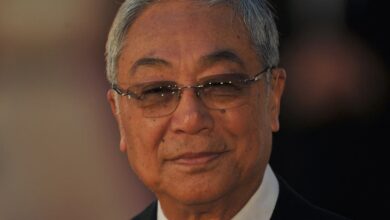‘People want to hold onto their experiences of Harry Potter’: Harry Melling on the wizarding franchise, the Coen bros and The Pale Blue Eye

Harry Melling has achieved something quite rare. At 10 years old, he stomped and screamed his way into what would become one of the biggest film franchises of all time, as the present-counting, cake-inhaling Muggle cousin of Daniel Radcliffe’s young wizard in Harry Potter and the Philosopher’s Stone. But the actor has managed to wriggle free of that association, for the most part, and has whittled out a career playing some of the most fascinating, peculiar characters on screen. There was his haunting performance as a limbless artist in the Coen brothers’ anthology film The Ballad of Buster Scruggs. Then his role as a preacher who pours venomous spiders over his head in horror noir The Devil All the Time. Now, he’s playing the skittish, misunderstood young Edgar Allan Poe in gothic detective mystery The Pale Blue Eye.
Sitting opposite the 33-year-old in the soft glow of a London hotel room, I soon understand how he did it. There’s a twinkle to him, a curious edge. His porcelain-white cheekbones jut out below strong black curls. He leans forward, neck craned, fixing me with his own pale blue eyes. His knuckles knock on the table between us – searching for words, hammering home a point. This is not a man destined for cookie-cutter parts. That would be a waste.
Melling has become something of a Netflix darling, with The Pale Blue Eye being the actor’s fourth project on the streamer in two years: it arrives after superhero movie The Old Guard, in which he played a suave, ruthless pharma CEO; The Devil All the Time; and The Queen’s Gambit. Melling was the kind Kentucky chess champion who befriends Anya Taylor-Joy’s child prodigy. “It’s just a coincidence that Netflix has wanted to hire me more than others,” he says, insisting that he doesn’t “feel like a Netflix poster boy”.
In the new film, Melling plays the young American writer opposite Christian Bale’s veteran detective Augustus Landor, who is summoned to the prestigious West Point military academy in the 1830s to investigate a suspicious and gruesome death. Poe really was a cadet at the academy during that decade, but Landor and the crimes he’s solving are all invented. It’s a flamboyant performance from Melling. His Poe is a heavy drinker with a Southern drawl, who bows and sashays across rooms while presenting evidence to Landor. The Independent’s critic Clarisse Loughrey wrote: “Melling’s performance is the real draw … he embraces Poe’s pompous, showman nature … while drawing him back from the edge of parody, allowing instead for a certain delicate woundedness.” Set against a backdrop of crunching snow in the Hudson Valley, New York State, his portrayal of Poe reveals a man whose “manner, age and aesthetic” have led to abuse from the other cadets.
Melling loved acting with Bale, whom he calls “one of the most generous performers I’ve ever worked with”. Did he witness any method techniques? “I don’t knooow really what that is,” he says, dragging out the vowel. “And maybe that’s a getting-myself-out-of-a-corner answer, but my experience working on it was that we’d turn up, not really talk about the scene, and just start playing it. There was no staying in character, but I guess you’re always held within some form of character just because you’re wearing the clothes and you’re in that environment as that person. I think method acting sometimes gets a branding that’s unhelpful.”
He hasn’t come across the more extreme end of method acting, like, for example, Jim Carrey refusing to break character for four months while playing comedian Andy Kaufman in the 1999 biopic Man on the Moon. “What do I feel about that? I feel each to their own,” Melling says. “Whatever gets you to the place you need to be at. Sometimes I completely understand why you put yourself through a particular situation to get to where you need to be when someone shouts ‘Action’. Other times I think to myself, ‘Was that necessary?’ But sometimes you have to channel things, and that might take a bit of time; to step off set before doing something that would demand a lot of who you are.”
The Pale Blue Eye’s director, Scott Cooper, cast Melling in the film after watching him in the Ballad of Buster Scruggs vignette “Meal Ticket” opposite Liam Neeson’s travelling impresario. Melling collaborated with Joel Coen again in The Tragedy of Macbeth, as Malcolm, the elder son of the king, Duncan, who is murdered by Macbeth. He dreams of joining the ranks of the siblings’ frequent collaborators, like Frances McDormand (nine films) or Steve Buscemi (seven). “Who doesn’t, right?” he says. “They’re incredible. The fact they said ‘We want this guy’” – he gestures at himself – “‘to play that role in Buster Scruggs’ was a huge moment for me, in terms of their validation.”
Melling says he has “no idea” what it is the brothers look for that they might have seen in him. When I push him to make an immodest guess, he erupts into a big, delicious laugh. “I think they like actors who are up for, in a weird way, making a fool of themselves,” he says. “People who are gonna take risks.” He commends the specific way in which the filmmakers work. “They know every frame of their film,” he says. “Famously, in one film, maybe Fargo, there were only two camera set-ups they didn’t use in the edit. Joel trained as an editor, so it’s just about picking out those moments to moments to moments. In terms of performance, they leave that up to you to have fun with, which is why you get these very crafted films but these quite eccentric characters living inside them.”
The Coen brothers also love theatre actors, and Melling did a lot of that – including in The Hothouse and King Lear – after he trained at The London Academy of Music and Dramatic Art, which has also produced stars such as Benedict Cumberbatch, Ruth Wilson and Chiwetel Ejiofor. It was while he was at Lamda that Melling lost a lot of weight – about five stone. His change in image meant that when the actor returned to play Dudley Dursley in Harry Potter and the Deathly Hallows – Part 1, three years after he’d appeared in Order of the Phoenix and skipping the movie in between, producers put him in prosthetics for continuity. The things written about Melling around the time of his weight loss, in 2009, are quite shocking. In one newspaper, his childhood role was described as Potter’s “lard-bucket cousin”, with the interviewer writing: “There’s no trace now of the piggy eyes and double chins in this 20-year-old.”
It was something Melling got used to. “I know the interview you’re talking about, and you’ll know what I feel about that,” he says, laughing uneasily. “Listen, I get it. Well, I don’t get it, but I, um…” he falls silent for a moment, his chair creaking. “When you’re 10 years old and you play a role like that, people are going to think of you as that thing, and are going to want to hold on to that thing. Obviously, that was 23 years ago. And obviously, that writer was trying to hook an audience in, so I understand why they’re saying those things, but I just have to read that and accept that that’s their way into the interview. There’s nothing really else I can say.”
When I ask whether it ever got easier reading that sort of stuff, he lets out a pained sigh. “I think so,” he says. “Umm. I have no control over that narrative. But I went to drama school and I lost some weight, and that’s it.” He laughs. “To me! And people will find fascination with that. They want to ask why and how I did it, but that’s not of any interest to me whatsoever. People want to hold on to these experiences of when they saw the film, so I get why that becomes the opening gambit.”
Does he think the weight loss has had an impact on his career, and on his ability to shed the Harry Potter association? “I think you can be an actor in whatever shape you want to be,” he says. “But losing weight at the time was not a conscious decision at all, it was just something that happened. And of course that makes people see you in a different way, and maybe that opens up different casting opportunities. I don’t think that was a conscious decision. I mean maybe in hindsight, somewhere in me, I’ve always been interested in the actors that transform… so maybe that’s where the instinct to do that came from.”
Melling is not in touch with his Potter co-stars – Radcliffe, Emma Thompson, Rupert Grint and Tom Felton. He didn’t actually share many scenes with them – he mainly hung out on 4 Privet Drive with Mr and Mrs Dursley, played by the late Richard Griffiths and Fiona Shaw. “It’s that weird thing,” he says, “we did it when we were so young. I think everyone’s sort of gone off and done their own things. A lot of them have left the UK, which is interesting. I’ve kind of stuck around here.”
When it comes to the debate over JK Rowling’s controversial views on transgender rights, he echoes the statement given by Radcliffe. “I can only speak for myself, and what I feel, to me, is very simple,” he says, “which is that transgender women are women and transgender men are men. Every single person has the right to choose who they are and to identify themselves as what’s true to themselves. I don’t want to join the debate of pointing fingers and saying, ‘That’s right, that’s wrong,’ because I don’t think I’m the correct spokesperson for that. But I do believe that everybody has the right to choose.”
One day, Melling wants to return to writing. His poetic one-man play Peddling, about a door-to-door salesman in north London, was raved about in The New York Times as “powerful and delicately calibrated” when it ran off-Broadway in 2014. “It’s just giving yourself enough time to do it, and having the right idea,” he says. “When I wrote Peddling, I knew I had to do it. There was an impulse. And I had the space and time to do a first draft, which was awful, and then build from that. But I don’t have the same spark yet.”
Melling, Richard Griffiths and Fiona Shaw as Harry Potter characters Dudley, Vernon and Petunia Dursley
He can next be seen in the new film from The Trip’s Michael Winterbottom, Promised Land, in which he plays a police officer hunting for the charismatic poet and Zionist freedom fighter Avraham Stern in 1930s Tel Aviv. He loved the shoot. “Michael doesn’t shout ‘Action’, it just seems to happen,” Melling says, “which is in keeping with lots of the documentaries he makes – it’s about witnessing events as opposed to constructing them, in a strange way.” After that film, who knows? But it will certainly be a long way from 4 Privet Drive.
‘The Pale Blue Eye’ arrives worldwide on Netflix on Friday 6 January 2023, and is being shown in select cinemas now
Melling as a limbless artist in ‘The Ballad of Buster Scruggs’





